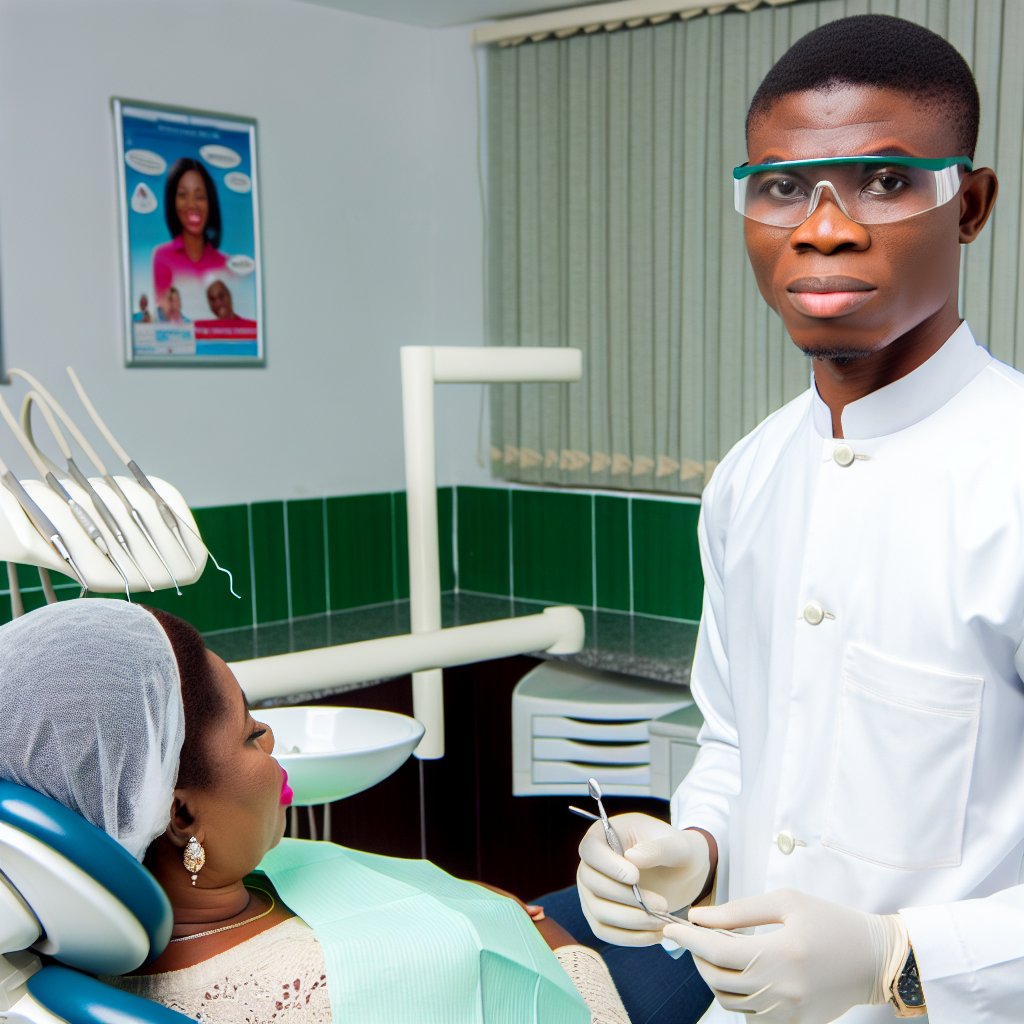Introduction:
Patient rights and dental care standards are crucial aspects of healthcare in Nigeria.
Understanding patient rights is essential for ensuring quality care and ethics in dental practices.
Patients in Nigeria often face challenges such as lack of access to affordable dental care.
They also experience limited treatment options and inadequate information about their rights.
Patient Rights in Dental Care
Patient rights in healthcare encompass the right to information, privacy, consent, and confidentiality.
Specific Patient Rights Related to Dental Care in Nigeria
Dental patients in Nigeria have the right to quality care, informed consent, privacy, and confidentiality.
Importance of Protecting and Advocating for Patient Rights
Protecting patient rights ensures ethical treatment, enhances trust, and improves overall quality of care.
Ensuring Informed Consent
Informed consent is crucial in dental care as it empowers patients to make informed decisions about their treatment.
Privacy and Confidentiality
Patients have the right to privacy and confidentiality when receiving dental care to protect their personal information.
Access to Quality Care
Patients should receive quality dental care that is safe, effective, and in line with professional standards.
Treatment Options and Alternatives
Patients have the right to be informed about available treatment options and alternatives to make informed choices.
Clear Communication
Effective communication between patients and dental healthcare providers is essential for understanding treatment plans and outcomes.
Respect and Dignity
Patients should be treated with respect and dignity, regardless of their background or medical history.
Complaints and Grievances
Patients have the right to file complaints and grievances if they feel their rights have been violated or if they are dissatisfied with their care.
Advocacy for Patient Rights
Dental professionals and organizations should advocate for and protect patient rights to ensure optimal care delivery.
Empowering Patients
Educating patients about their rights and actively involving them in their care empowers them to make informed decisions.
Continuous Monitoring and Improvement
Regular monitoring of patient rights and feedback helps in identifying areas for improvement in dental care services.
Legal Framework
Nigeria has laws and regulations that protect patient rights in healthcare, including dental care.
Collaboration with Stakeholders
Collaboration between patients, healthcare providers, policymakers, and regulatory bodies is essential for upholding patient rights.
Protecting Patient Rights
Protecting patient rights in dental care is paramount for ensuring ethical and quality treatment in Nigeria.
Advocating for patient rights, ensuring informed consent, respecting privacy and dignity, and promoting clear communication are key aspects of upholding patient rights in dental care.
By prioritizing patient rights, dental healthcare providers can improve trust, satisfaction, and overall care outcomes for patients.
Overview of Dental Care Standards in Nigeria:
The current state of dental care in Nigeria is a mixed bag.
While there are some providers that adhere to high standards,
there are also many challenges in maintaining consistent quality care.
Regulations and Guidelines for Dental Care Providers:
In Nigeria, dental care providers are regulated by the Medical and Dental Council of Nigeria.
This council sets guidelines for qualifications, practice standards, and ethical conduct.
These regulations are meant to ensure that patients receive safe and effective care.
Challenges in Maintaining High Standards in Dental Care:
One major challenge is the shortage of qualified dental professionals in Nigeria.
This scarcity leads to long wait times for appointments and limited access to care.
Another challenge is the lack of modern equipment and technology in many dental facilities.
Without these tools, providers may struggle to deliver the best possible care to patients.
Additionally, there are issues with affordability and financial constraints for patients seeking dental care.
Explore Further: Restorative Dental Care for Special Needs Patients
Access to Dental Care:
Analysis of accessibility and affordability of dental care services in Nigeria
Access to dental care services in Nigeria is a critical issue that affects individuals’ overall oral health.
The accessibility and affordability of these services play a significant role in determining the quality of dental care received by patients.
Unfortunately, there are numerous challenges that hinder many Nigerians from accessing adequate dental care.
Discussion on the inequality in access to dental care services
One of the main issues surrounding access to dental care in Nigeria is the inequality in service availability between urban and rural areas.
Urban centers have more dental clinics and services compared to rural communities.
This disparity creates barriers for individuals in rural areas who may have limited transportation options or financial resources to seek dental treatment.
Transform Your Career with Expert Guidance
Get personalized mentorship consulting that’s tailored to your unique path. Our expert advice is actionable and exclusive.
Get StartedFurthermore, there is also a significant disparity in the distribution of dental professionals across the country.
The majority of dentists are concentrated in urban centers, leaving rural communities underserved.
This unequal distribution exacerbates the existing access barriers and contributes to the widening gap in oral health outcomes between urban and rural populations in Nigeria.
Importance of addressing barriers to access for all patients
It is crucial to address the barriers to access to dental care services for all patients in Nigeria.
Lack of access to timely and affordable dental care can lead to poor oral health outcomes.
These include untreated cavities, gum disease, and other oral health issues.
These conditions can further escalate into more severe health problems if left untreated, impacting individuals’ overall well-being and quality of life.
By ensuring equal access to dental care services, policymakers and healthcare providers can work towards improving oral health outcomes for all Nigerians.
This includes implementing initiatives to increase the availability of dental clinics in underserved areas.
Further, providing financial assistance programs for low-income patients is essential.
Promoting oral health education can help raise awareness about the importance of regular dental check-ups and preventive care.
Addressing the challenges related to accessibility and affordability of dental care services in Nigeria is essential for promoting overall oral health and well-being among the population.
By tackling these barriers and advocating for equal access to dental care for all patients, we can work towards achieving better oral health outcomes and reducing oral health disparities across the country.
See Related Content: Impact of Anatomy Studies on Nigerian Medical Practice
Quality of Dental Care
It is crucial to prioritize high quality dental care services to ensure the overall health and well-being of patients.
When patients receive top-notch dental care, they are more likely to experience positive outcomes and maintain good oral hygiene practices.
High quality dental care can also contribute to the prevention of oral diseases, such as cavities, gum disease, and oral cancer.
By prioritizing quality in dental care services, healthcare providers can build trust with patients and improve overall satisfaction levels.
Factors That Contribute to High Quality Dental Care
One significant factor that contributes to high quality dental care is the expertise and training of dental professionals.
Dentists and dental hygienists who receive proper education and training are better equipped to provide quality care to their patients.
Utilizing advanced technology and up-to-date equipment in dental practices also plays a crucial role in delivering high quality care.
Effective communication between patients and dental providers is another key factor in ensuring the quality of dental care services.
Strategies to Improve Dental Care Quality in Nigeria
One strategy to enhance the quality of dental care in Nigeria is to invest in continuing education and training for dental professionals.
By providing opportunities for professional development, dental providers can stay up-to-date on the latest techniques and advancements in the field.
Implementing quality assurance programs and conducting regular evaluations of dental practices can also help improve the overall quality of care.
Promoting a culture of patient-centered care and empowering patients to be active participants in their oral health can lead to better outcomes.
Collaborating with other healthcare professionals and organizations to establish best practices and guidelines for dental care can further enhance the quality of services provided.
Importance of High Quality Dental Care Services
Ensuring high quality dental care services is paramount to promoting oral health and overall well-being.
By focusing on factors that contribute to quality care and implementing effective strategies, Nigeria can improve the standard of dental services and ultimately enhance the patient experience.
You Might Also Like: Restorative Options for Missing Teeth

Informed Consent in Dental Procedures:
Informed consent in healthcare is the process by which a healthcare provider ensures that a patient understands the risks, benefits, and alternatives to a proposed treatment or procedure before they agree to it.
It involves providing information in a clear and understandable manner so that the patient can make a decision based on their own values and preferences.
Importance of Obtaining Informed Consent in Dental Procedures
Obtaining informed consent in dental procedures is crucial for several reasons.
Firstly, it helps to protect the rights of the patient by ensuring that they have the necessary information to make informed decisions about their treatment.
It also promotes autonomy and respect for the patient’s wishes and preferences.
Additionally, informed consent can help to build trust between the patient and the dentist, leading to better communication and more positive treatment outcomes.
Examples of Scenarios Where Informed Consent is Essential in Dental Care
- Before performing a root canal treatment, the dentist must explain the procedure, risks, and alternatives to the patient.
- Prior to extracting a tooth, the dentist should obtain informed consent from the patient after discussing the implications of the procedure.
- If a patient needs to undergo a dental implant procedure, the dentist must provide detailed information about the process, potential complications, and aftercare requirements to obtain informed consent.
- Before administering sedation during a dental procedure, the dentist must explain the risks and benefits of sedation to the patient and obtain their informed consent.
Uncover the Details: Understanding Mental Health Challenges in Nigeria
Patient Safety in Dental Care
Examination of patient safety measures in dental care settings is crucial to providing quality care.
One key measure is infection control, which includes sterilizing instruments and maintaining a clean environment.
Dental professionals should also follow strict protocols for patient identification and consent before starting any procedure.
This helps prevent mix-ups and ensures patients are informed about their treatment.
Regular training for dental staff on emergency procedures and CPR is essential to handle any adverse events promptly and effectively.
This can potentially save lives in critical situations.
Discussion on Common Risks and Complications in Dental Procedures
Despite advancements in dental technology, there are still risks associated with various procedures.
Common complications include infection, nerve damage, and allergic reactions to anesthesia or materials.
Surgical procedures like extractions or implants carry a higher risk of complications compared to routine cleanings or fillings.
Patients with underlying health conditions may also be more susceptible to adverse events.
Dental professionals should thoroughly assess patients’ medical history and discuss potential risks before proceeding with any treatment.
This helps manage expectations and minimize the chances of complications.
Strategies to Enhance Patient Safety and Prevent Adverse Events
Implementing a comprehensive patient safety protocol is essential for dental care providers.
This includes conducting risk assessments, creating contingency plans, and ensuring staff are well-trained in safety measures.
Regular audits and evaluations of safety practices can help identify areas for improvement.
They should address any lapses in protocol promptly.
Open communication between staff members and patients is crucial to ensuring a safe and comfortable environment during treatment.
By prioritizing patient safety and continuously striving for excellence in care delivery, dental practices can enhance their reputation.
This will build trust with patients and lead to better outcomes and satisfaction for all parties involved.
Patient Rights and Standards in Dental Care
After discussing patient rights and dental care standards in Nigeria, it is important to summarize the key points.
Patients need to understand their rights and advocate for quality dental care in the country.
Promoting patient-centered care and upholding standards in dental practices are crucial for overall healthcare improvement.
Additional Resources
The Lancet Nigeria Commission: investing in health and the future of …




